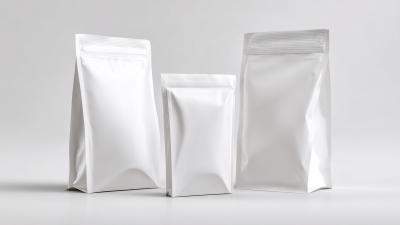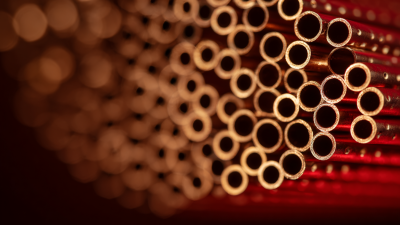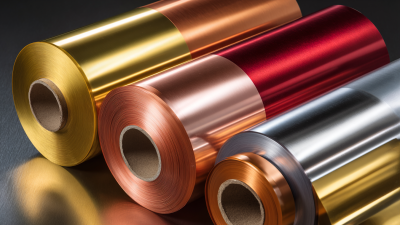Leave Your Message
-
Phone
-
E-mail
-
Whatsapp
-
Whatsapp+86 18621680941


In the landscape of modern manufacturing, extrusion tubes play a pivotal role across various industries, driven by their versatility and efficiency in production processes. According to a recent report by Smithers Pira, the global market for extruded plastic products is projected to reach $250 billion by 2025, highlighting the increasing dependence on these components in sectors ranging from automotive to aerospace. Extrusion tubes, specifically, are essential in applications such as fluid conveyance, structural support, and even specialized electronics, where precision and material integrity are paramount. As manufacturers continue to adopt advanced extrusion techniques, understanding the nuances of these tubes becomes crucial for optimizing performance, reducing waste, and enhancing product innovation in a competitive marketplace.

In modern manufacturing, extrusion tubes play a crucial role in streamlining production processes, contributing significantly to efficiency and precision. These tubes are crafted through the extrusion process, allowing manufacturers to create consistent shapes and sizes that meet stringent specifications. This consistency minimizes waste due to defects, helps maintain quality standards, and ultimately reduces production costs. By employing extrusion tubes, manufacturers can ensure a seamless flow of materials through various stages of production, facilitating faster turnaround times and improving overall productivity.
Additionally, extrusion tubes enable greater flexibility in design and application. They can be tailored to meet specific industry needs, whether in automotive, aerospace, or consumer goods. This adaptability not only supports diverse manufacturing requirements but also allows for innovative approaches to product development. As industries continue to seek ways to improve efficiency, the strategic use of extrusion tubes becomes indispensable, driving both operational excellence and competitive advantage in today’s fast-paced market.
| Dimension | Value |
|---|---|
| Material Types | Aluminum, Steel, PVC, ABS |
| Typical Diameter Range (mm) | 5 - 100 |
| Common Applications | Automotive, Aerospace, Construction, Electronics |
| Process Efficiency Improvement (%) | 20 - 30 |
| Lead Time Reduction (Days) | 5 - 15 |
| Cost Savings (%) | 15 - 25 |
| Recyclability | High |
Extrusion tubes have become a cornerstone in modern manufacturing, finding innovative applications across various industries. The versatility of these tubes allows them to be tailored for specific needs, leading to improved efficiency and functionality in products ranging from automotive parts to medical devices. The global thermoplastic polyurethane (TPU) market, valued at $2.53 billion in 2023, is expected to witness substantial growth, projected to reach $5.44 billion by 2032. This trend highlights the increasing importance of extrusion technologies in meeting the rising demand for high-performance materials.
In the automotive and construction sectors, extrusion tubes serve critical roles in enhancing product quality and durability. As companies strive for excellence, exemplified by awards for quality improvement initiatives, the focus on advanced manufacturing processes is more crucial than ever. The upcoming CHINAPLAS exhibition showcases the latest innovations in rubber and plastic technology, reflecting the industry's commitment to quality and advancement.
**Tips:** When selecting extrusion tubes for your project, consider the material's properties and adaptability to various applications. Conducting thorough research on market trends can also provide insights into future growth areas, helping manufacturers stay ahead of the competition. Always prioritize quality and sustainability in your manufacturing processes to ensure long-term success.
This chart illustrates the innovative applications of extrusion tubes across various industries, showcasing their significance in manufacturing processes.
Extrusion tubes play a critical role in modern manufacturing, especially when compared to traditional techniques such as machining or casting. According to a report by the Freedonia Group, the demand for plastic extrusions, including tubes, is expected to exceed $40 billion by 2026. This growth highlights the efficiency and cost-effectiveness of extrusion processes, which often result in reduced waste and shorter production times compared to alternative methods. For instance, machining typically incurs higher costs due to material waste and labor-intensive processes, while casting can involve longer lead times and higher energy consumption.
In addition to cost and efficiency advantages, extrusion tubes also provide superior material properties and versatility. A study published in the Journal of Manufacturing Science and Engineering indicates that extruded products can exhibit improved strength-to-weight ratios, making them ideal for applications in automotive and aerospace industries. Furthermore, extrusion technology allows for the creation of complex shapes and designs that would be challenging to achieve with machining or other fabrication techniques. As manufacturers continue to prioritize innovation and sustainability, extrusion tubes will remain a vital component in meeting industry demands and advancing manufacturing capabilities.

The use of extrusion tubes in manufacturing offers significant sustainability benefits that align with modern eco-friendly practices. These tubes, made from materials like aluminum and plastic, can be designed to minimize waste during production. By utilizing an extrusion process, manufacturers can create products with near-zero scrap, maximizing material usage and reducing the impact on landfills. This efficiency is not only cost-effective but also crucial given the increasing focus on reducing waste in industrial operations.
Moreover, extrusion tubes contribute to sustainability through their lightweight nature, which can enhance energy efficiency in transportation and usage. Lightweight products require less energy to move, thereby lowering carbon emissions associated with logistics. Additionally, many extrusion materials are recyclable, enabling a closed-loop system where used products can be reprocessed into new tubes. This recycling capability further supports sustainable practices, as it reduces reliance on virgin materials and fosters a circular economy in manufacturing sectors. As industries continue to face pressure to adopt greener practices, extrusion tubes stand out as a practical option that promotes both performance and environmental responsibility.

The advancements in extrusion tube technology are poised to significantly impact modern manufacturing processes. Recent studies indicate that the global market for extrusion technology is expected to reach approximately $290 billion by 2027, reflecting a CAGR of around 5.2%. This growth is driven by the increasing demand for lightweight and durable materials across various sectors, including automotive and aerospace, where extrusion tubes are critical for performance and efficiency.
Emerging innovations, such as the use of advanced composite materials and the integration of automation in extrusion processes, are enhancing the quality and performance of extrusion tubes. For instance, recent research has highlighted the potential of nanoparticle reinforcement in polypropylene for improved mechanical properties, resulting in extruded products that are not only stronger but also environmentally sustainable.
As manufacturers continue to adopt these cutting-edge technologies, the focus on optimizing production efficiency while maintaining high-quality standards remains paramount, placing extrusion tubes at the forefront of manufacturing innovation.






